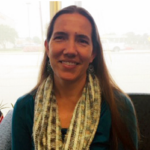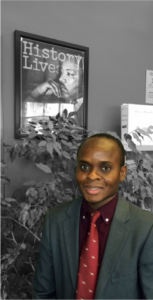Meet Dollar General Literacy Foundation’s Student of the Year: Bushiri Salumu
by Elizabeth Severson-Irby
This year at the ProLiteracy conference, Bushiri Salumu was named Dollar General’s Student of the Year, an award given to an outstanding adult learner. Bushiri is that and more, and his story is one of resilience, perseverance, and courage. He was born and grew up in the Democratic Republic of Congo with eight brothers and sisters. His father was a family medicine physician and his mother was a teacher with a degree in chemistry. Bushiri loved to play soccer and dreamt of becoming a cardiologist. However, in 2007, all of this changed when Bushiri lost both of his parents and six of his siblings due to civil war.
At the age of 17, Bushiri, his sister, and his brother, aged 15 and 13 respectively, joined many others fleeing the civil war. For eleven months, the group of refugees walked day in and day out to get to a refugee camp in Zambia—a distance of about 1,000 miles. For four years, they lived at the camp, oftentimes in overheated, overcrowded tents. Finally, on October 17, 2012, Bushiri and his two siblings resettled in Charlottesville, Virginia.
Bushiri’s story does not stop there. Since coming to the United States in 2012, he has learned English, obtained citizenship, earned his high school equivalency diploma, and acquired his certified nursing assistant (CNA) license. Bushiri recounts his experience when he first arrived in the United States:
“I came directly to Charlottesville to the International Rescue Committee (IRC). The government helped us with food stamps and Medicare for about eight months and paid for housing for four months. Since I was the head of the household, they helped me find a job three weeks after I got here. They referred us to English classes. Before I took English classes, they referred me to a speech pathologist. In Congo, it was hard for me to speak because my stutter was terrible. But when I came here, they tried to help me. But that did not help at first, because when I don’t understand the language, I don’t know how to speak. But now, today, that I know English, I try to meet with my speech pathologist every month. Now my stutter is so much better.”
Government assistance was vital when Bushiri and his siblings first arrived, but he also noted how hard it was to be ready to pay for housing four months after arriving in the U.S. Trying to work, save money, and learn English was a difficult, demanding challenge. At times, his education had to take a back seat so he could work to save money:
“By taking English classes, I learned simple greetings. After that, I was transferred to Thomas Jefferson Adult and Career Education (TJACE). I took some classes there, but I was working full time at the car wash. After a few months, I stopped taking classes and was working two full-time jobs so I could save money to buy a car. My second full-time job was housekeeping. After I bought my first car, I went back to school and took three classes there. I passed math, science, and social studies, but my time [work schedule] interfered with the time the learning center met, so I was directed to the literacy volunteers. When I came here [Literacy Volunteers of Charlottesville/Albemarle], I was able to pass my last GED® test. I took some citizenship classes here so I could get my citizenship. Then, they suggested that if my dream was to be in the medical field and [I] didn’t have any experience, it would be better if I started with [the] CNA. Then I signed up for CNA classes with PVCC (Piedmont Virginia Community College). I also still take English classes.”
Without the cooperation of several services and educational programs, Bushiri may not have received the help and support he needed to learn English and to further his education. He believes he would be further along in his goals if he were able to make education his primary focus:
“For many people, if you have the chance and a sponsor to pay for your food and housing, then it is better to just go straight to school. Because if I went straight to school, then maybe after seven years of being here I could have my Bachelor’s [degree].”
But Bushiri is grateful to everyone who helped him along the way. He noted that many people contributed to helping him get to where he is now:
“I can say I have had a lot of support from IRC, TJACE, and the literacy volunteers. The tutors helped me with academics and gave me advice, strategies, and ideas on how I could pass the exams, but also gave me advice on life. Then, I had a friend that I met with; he was a tutor with TJACE. I met him in 2016 and he is the one that has helped me a lot. He tutored me in math, science, and social studies.”
He also noted that along with academics, he had a lot to learn about American culture:
“The culture we came from, when you talk to someone that is older than you, you don’t make eye contact; you would get in big trouble if you did. So I had to learn how to make eye contact. Then, in my culture, someone who is the same age as your mother or father, you call them ‘mother’ or ‘father.’ Here they would say, ‘I am not your mom.’ So, I had to learn that too. They tried to give us education at the IRC to help us learn these things. I also had help from the literacy volunteers and the people at TJACE.
The school system I came from is very different; we don’t get a chance to use computers. So the big challenge is computer skills. Kids here, they have help typing and finding resources. But there is no specific program to help adults with typing. I think that, if I had enough money, I would want to open a center to help adults that have a dream to go to school.”
From computer skills, to life skills, to academics, to speech therapy, to English classes, Bushiri emphasized how important each program was in aiding him to get to where he is today. He is thankful for all of the encouragement and support each program provided. However, he also mentioned how important it was for him to be patient with the process:
“The first thing is to be patient. Because this country is a country of opportunity, if you have a dream, the first thing is to be patient. And then to know what kind of group you can be associated with to help you. And then go to school so you can find a better job.”
Bushiri plans to continue his education to include a Bachelor’s degree and a Nurse Practitioner license. He loves his current job as a neonatal CNA and wants to continue working in that department:
“My next step is to be a neonatal nurse practitioner. I am working in the neonatal unit now; it is a very emotional job. We work with 22-week to 27- or 30-week old babies. Usually they are in bad condition. I have support in my job to help me. I work Friday-Sunday; Monday-Thursday I am taking pre-classes for nursing. My next license will be [the] RN, then bachelor’s [degree] two years after that. After that, nurse practitioner.”
Before we concluded our interview, Bushiri said, “I feel so lucky to be a part of this community and have all of their support.’’ It is adults like Bushiri that keep us doing what we are doing and show how important adult education is. His story also highlights the importance of partnerships and cooperation among different programs and agencies. Without their combined support, Bushiri may have been limited in what he thought was possible; now, there is no stopping him.

Elizabeth Severson-Irby is the literacy specialist at the Virginia Adult Learning Resource Center (VALRC). In her role, she provides leadership for instruction and program management in Virginia’s adult education and literacy programs, working with both public and private agencies and educational programs to ensure that adults have access to the educational resources they need.
About the Dollar General Literacy Program
“J.L. Turner was functionally illiterate with only a third-grade education. His father died in an accident, and J.L. quit school so he could work on the family farm and help provide for his family. With hard work and determination, J.L. Turner went on to co-found Dollar General.
In 1993, the Dollar General Literacy Foundation was established in his honor. [They] understand that life can present many obstacles, but [they] also know it’s never too late to learn! Like J.L., so many others desire to better their lives and the lives of their families and it’s in this spirit that the foundation has flourished.
[Dollar General] grant programs are available to qualifying organizations in the 44 states where Dollar General stores are located. [They’ve] awarded more than $160 million in grants to literacy organizations that have helped more than 10 million individ-uals learn to read, prepare for the high school equivalency, or learn English. [They] believe that everyone deserves an equal opportunity to receive a basic education. It’s never too late to learn.”
About Us. (n.d.). Retrieved from https:// www.dgliteracy.org/about-us/
Virginia is currently undertaking an initiative to “align education and training programs in ways that make it easier for individuals [like Bushiri] to access and complete pathways to family-supporting careers.”
The Sector Strategies and Career Pathways Academy (an online learning academy for Virginia’s Workforce Professionals) seeks to “strengthen the leadership capacity of workforce system partners and practitioners to incorporate sector partnership and career pathway strategies and thinking as integral components into every Virginia region.”
To learn more, see p. 20 or visit the Sector Strategies and Career Pathways Academy website.
